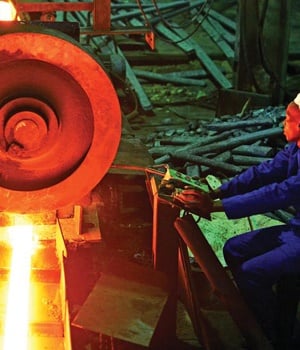
ArcelorMittal SA has given in to persistent state demands and will submit to government regulation of steel prices, introduce black ownership and settle the extraordinary number of competition cases against it.
In exchange, the group now has nearly everything it makes behind a 10% tariff wall, with government apparently ready to push that even higher with special safeguard duties to fend off alleged Chinese dumping of cheap steel.
In a dramatic farewell presentation on Friday, the steel company’s outgoing CEO, Paul O’Flaherty, pleaded guilty to everything the formerly state-owned steel monopoly has been accused of for more than a decade.
ArcelorMittal’s behaviour amounted to “complete and utter arrogance to our customers and the government”, said O’Flaherty. “If we had been a good citizen, we would have had protection.”
The complete reversal of ArcelorMittal’s long acrimonious history with the state has finally delivered something close to the holy grail that the department of trade and industry has been chasing since 2004: a “developmental steel price”.
O’Flaherty announced that ArcelorMittal was “ready to sign” on a “fair pricing model”.
For years, ArcelorMittal had charged import parity prices. Over time, this shifted to a “basket price” that involved copying the local price on an average of other, mostly developed, countries’ domestic prices.
This was decried as an elaborate ruse to justify import parity pricing under a new name and avoid further sanctions from competition authorities.
ArcelorMittal has a monopoly on the production of flat steel products in South Africa.
“With the demise of Evraz, we can supply the entire market,” said O’Flaherty. The details were sketchy, but O’Flaherty said that the price would be “regulated” as well as “competitive and fair”.
In the current market, this might ironically mean a steel price higher than import parity.
“If you protect us, you can’t have ArcelorMittal charging the highest prices in the world,” said O’Flaherty.
Government’s demand for a developmental price was rooted in the fact that ArcelorMittal was built with state resources and substantially subsidised before and after it was privatised in 1989.
ArcelorMittal wanted more concessions, especially a reversal of government’s decision to exclude steel from the calculation of “local” procurement in so-called designated products like power pylons, where all inputs have to be locally sourced.
Local steel does not count as “local” procurement – a move by government widely seen as a direct attack on ArcelorMittal’s pricing.
ArcelorMittal also wants Transnet to reduce its prices for moving iron ore to its steel plants. According to O’Flaherty, Transnet charged $20 (R318) per ton of iron ore, while it cost only $8 to ship it to the country.
He also took a swipe at the banking sector, suggesting that creditors had not been kind during the current economic doldrums.
“In South Africa today, if we don’t pull together we are doomed. It’s easy to kick the dog while it is down,” he said.
ArcelorMittal announced a loss of R8.6 billion for 2015. A major part of that was a R3.6 billion impairment of the Saldanha steelworks, which has been rendered unprofitable by falling steel prices and rising power costs.
Saldanha would not benefit from tariffs or designations because it was an export-oriented mill and would now be reviewed.
The evolving “pact” with government included not retrenching people, and ArcelorMittal would “defend” the 1 100 jobs at Saldanha, O’Flaherty said.
“If we get protection, we must not retrench,” he said. “I can’t do that if I’m losing R8.6 billion a year.”
ArcelorMittal SA was technically insolvent at the end of last year until majority shareholder ArcelorMittal last month converted a R3.2 billion shareholder loan into shares.
ArcelorMittal SA announced the identity of its potentially soon-to-be BEE partners on Friday – an attempt to tackle another longstanding gripe from government.
Likamva Resources would be the vehicle, comprising a varied collection of black businesspeople.
Notables listed as directors of the entity since November last year include Yakhe Kwinana – a board member of both SAA and the Jacob Zuma Foundation.
The consortium is led by Noluthando Gosa, a national planning commissioner; and Leslie Maasdorp, the South African vice-president of the new Brics Development Bank.
Other directors of Likamva include Ndileka Nobaxa, an executive of Gidani, the embittered former National Lottery operator that lost its licence to Ithuba Holdings last year.
Investment banker Warren Wheatley, engineers Eldred Boonzaaier and Aron Matunda, and former ArcelorMittal spokesperson Themba Hlengani are also part of the consortium.
The newly constituted consortium marks ArcelorMittal’s first attempt to introduce black ownership after the disastrous courting of a group including President Jacob Zuma’s son Duduzane.
That deal was widely criticised as cynical because it was designed to secure ArcelorMittal’s access to cheap iron ore after Imperial Crown Trading managed to land a licence to part of the Sishen iron ore mine. It lost that licence in subsequent court cases and the deal fell apart.




 Publications
Publications
 Partners
Partners








